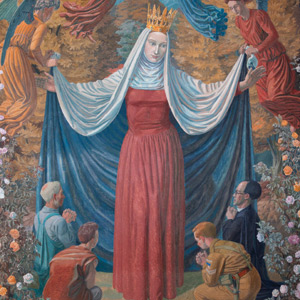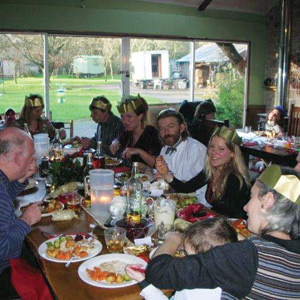Our small, woodland community at Christmas always feels – I hope it doesn’t sound too smug – deeply satisfying; which isn’t something one often says of Christmas. It’s a time of year, of course, that can feel tinny and trite: endless adverts, alcoholic frivolity papering over the cracks of historical family discord, the guilty feelings associated with over-indulgence and over-spending, the melancholia of the wrong present or the wrong word.
At the experiment in communal living that we have established in Windsor Hill Wood near Shepton Mallet, it’s different for a variety of reasons. Many of our guests are struggling with addiction issues, so we’re a strictly dry and drug-free site, and consequently our frivolity seems sincere rather than fuelled or fake. When someone gets loud, it’s simply high spirits because we’re on holiday. And because many of the people living with us also have eating disorders, we have to be cautious not to pile plates high with lardy grub that would simply gross them out. There has to be a degree of moderation during the day, which just makes the season seem more serious, but also more stable somehow.
This isn’t to say we don’t eat extremely well. Being Italian, my wife makes hundreds of cappelletti by hand, usually with the assistance of the troops. Cappelletti are traditionally eaten at Christmas in Parma: discs of pasta stuffed with breadcrumbs, parmesan cheese and tiny amounts of beef brisket, all served in a watery broth and covered with more parmesan. The house is transformed as one guest gathers eggs from the chicken coop while another walks over the Mendip Hills to get to Susan, the woman who supplies our beef in return for our sausages. This year, we’ve sadly slaughtered our old breeding sow, Harriet, and she yielded 2,300 sausages, so we’ll be combining moderation with a feast.
The presence of our livestock here – goats, chickens, pigs, sheep – certainly makes the message of the manger more accessible. At this time of year, Creation seems more united, with animals gathering close to the house, drawn into the warm straw of arks and barns and coops. As we distribute the sweet hay from last summer, the sheep race towards us, puffing from their nostrils. Living cheek by jowl with animals has a levelling effect, encouraging the humility that is one of the central motifs of the Nativity. And it fosters watchfulness too: this is a place where you do, literally, watch your flocks by night.
In a city, it’s often hard to grasp just how dark this time of year is. Out here in the sticks, it’s pitch black by mid afternoon. We’ve got electricity and torches, of course, but it would be simply gloomy if it weren’t for our fires. We heat our house and our water, and all the outbuildings and shepherds’ huts, with wood, and so we’re constantly gathering around fires together. This year, two of us, Kev and Stace, melted down the kilos of beeswax we got from our beehives and have been making candles. The smell of those candles, not to mention the mellow light they give off, makes Christingle seem very real.
My wife, it’s fair to say, is slightly obsessional about Christmas decorations. Francesca can spend a good hour just deciding where to put a pine cone. So the rest of us head out into the woodland to source more stuff: at this time of year, the trees are bare, their only clothing the ivy wrapped around their trunks. We tear off long lines of the stuff, and gather the glossy holly in the undergrowth. But best of all is the spindle tree: its light red fruits open out to reveal an exuberant orange seed inside. We use stray lumps of fleece from the sheep, hanging from hawthorn or blackthorn hedges, to make the presepio, the Italian version of the Nativity scene.
We’re a micro-community of 12, but for Christmas Day itself there are usually two dozen people around. Many of those who come to us simply don’t have family, or have a family they can’t abide. Many others come because, being recovering addicts, they want a place and a party without alcoholic or narcotic temptations. Sometimes guests who lived here in previous years roll up again, swelling the ranks. There will usually be a couple of ex-offenders, a rough sleeper or two, maybe even a widow or divorcee from the local villages. It’s a wonderful mix, the common denominator often being that these are people who all hate Christmas and yet, here, seem to love it.
Not many of those, I should say, come to our tiny chapel. We have a small, onion-shaped pod designed by one of our guests. In the centre it has a small woodburner, a candle and a cowbell, and around the edge a circle of straw bales as pews. Depending on who’s there, we sit in silence like a Quaker meeting or we follow the daily office of the Society of St Francis, which is used by what I think of as our two “mother ships”, Hilfield Friary and the Pilsdon Community in Dorset. Both have offered us wisdom and muscle over the years: Hilfield is a Franciscan friary; Pilsdon is the community on which we’re based, set up in 1958 by a maverick Anglican clergyman and his wife and modelled on Nicholas Ferrar’s Little Gidding. On Christmas morning, some of us gather there to give thanks.
A few Christmases ago, there was heavy snowfall, almost a foot, and inevitably we decided to make an igloo. We usually have one or two labourers here who know about building, and that day one of them, Callum, took charge, persuading all the troops to pack snow into the plastic storage boxes so that we soon had dozens of large, icy bricks. We slowly built a conical mound, closing it at the top and creating a small entrance at one end. Half a dozen of us sat inside, worshipping in the cramped, warm space we had just constructed.
There’s a tradition, for some reason, that on Christmas Day we all wear silly wigs. Last year we had the amusing sight of a tough nut just released from prison wearing a pink wig; there was Gary in an Afro; and a local fireman wearing blond plaits. Shepton Mallet is a town with its fair share of social deprivation: half the high-street shops are empty, and the rest are charity shops. So the presents we exchange tend to be cheap, more symbolic than classy. But there’s usually a backwoodsman among us who steals the show with incredible, crafty gifts. Last year a chap called Stefan had carved spoons for everyone, with their initials picked out on the handle. He had made “fairy doors” for the young girls out of bark and hazel, imitation wrens out of a lump of oak, and a sword for our worryingly aggressive son. I wouldn’t want to give the impression that our Christmas is entirely hippie – there are plenty of gifts bought online that arrive in glossy boxes – but the majority of the presents passed around are sourced within a mile of here. Sometimes they are simply a clump of tree seeds – acorns usually – wrapped in a rag.
But the funniest aspect of Christmas, as in most households, is the games. I’m fascinated by how important games and play are in communities. The British psychoanalyst Donald Winnicott believed that play in childhood was essential for the creation of a rounded, whole individual because play teaches about rules, fairness, spontaneity and invention. We have a tradition that we play Perudo on Christmas Day, also known as “liar’s dice”. It’s a bit like poker, and the enjoyment comes from the licence you’re given to deceive and doubt one another. After a year in which we’ve tried to foster trust and truthfulness, people are now conning and cunning. At Windsor Hill Wood many of our guests are, how should I say, habitual blaggers and rough diamonds, and it’s hilarious watching them and our children innocently trying to out-blag each other.
By then, there are usually one or two guitars out, and people will be singing old protest songs: last year Adam sang Woody Guthrie classics like “Hobo’s Lullaby” and “I Ain’t Got Nobody”, which reminded everyone that, today at least, they did have somebody, that they weren’t – as the lyrics go – just a “chunk of wood floatin’ on the sea”. Again, I wouldn’t want to give the impression that we’re complete Luddites: while some of us sang songs, just as many had their laptops out, the bright white apples illuminating the room as much as the fire and the candles. But as Adam segued into “Will the Circle Be Unbroken?”, it felt like a revival might be just around the corner. And that’s the hope of Christmas in the twenty-first century: that if we can keep it poor, rooted, organic and earthy, it will always give life, and give life meaning.
Tobias Jones’ book about his woodland sanctuary, A Place of Refuge: an experiment in communal living, is published by Quercus.
17 December 2015, The Tablet
All shall be well
Christmas at Windsor Hill Wood
La douce turns sour
 Loading ...
Loading ...
Get Instant Access
Subscribe to The Tablet for just £7.99
Subscribe today to take advantage of our introductory offers and enjoy 30 days' access for just £7.99





What do you think?
You can post as a subscriber user...
User Comments (0)